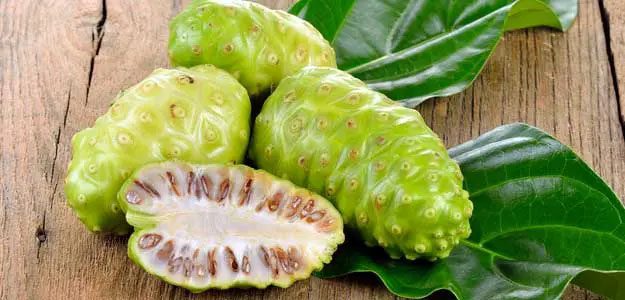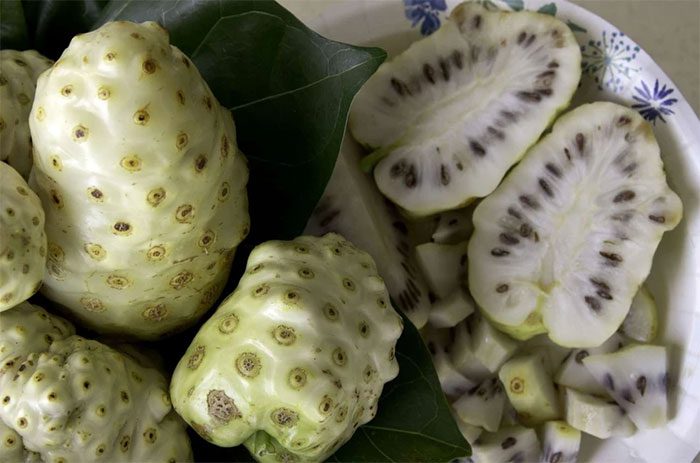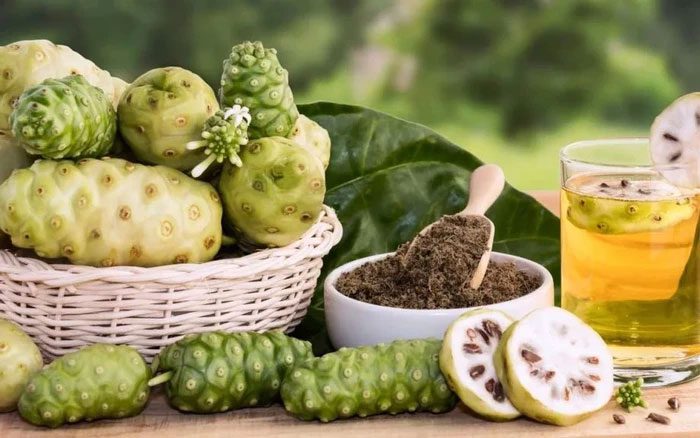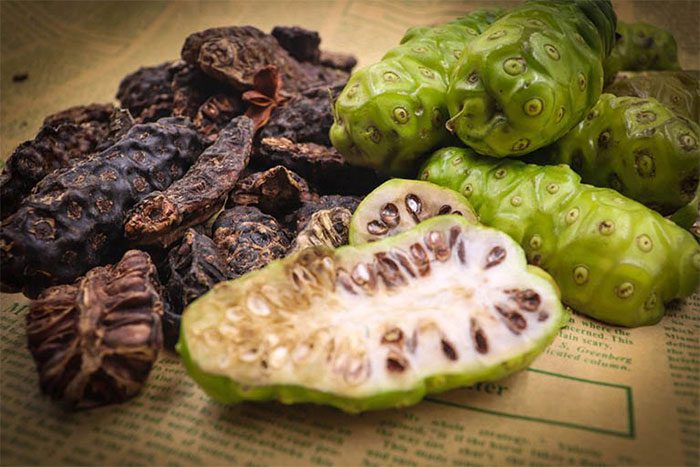Noni fruit contains many antioxidants, providing numerous health benefits. However, this fruit also contains substances that can be toxic to the liver if consumed in excessive amounts.
Benefits of Noni Fruit
The scientific name of the noni fruit is Morinda citrifolia, also known by various names such as cheese fruit, Indian mulberry, and morinda. This fruit has a bumpy exterior and a flavor profile that may not appeal to everyone. While some appreciate its unique aroma and taste, many find its smell quite strong and the taste difficult to enjoy.
Nevertheless, in the realm of health, noni fruit is recognized for its high nutritional value, supporting overall health, and has been utilized as a medicinal ingredient in Traditional Chinese Medicine.
1. Nutritional Value of Noni Fruit
Noni fruit is rich in vitamins, essential minerals, and particularly boasts a high content of powerful antioxidants, including:
- Vitamin C
- Biotin
- Folate
- Magnesium
- Potassium
- Calcium
- Vitamin E
Thanks to this rich nutritional profile, noni fruit offers a multitude of health benefits.

Noni fruit is packed with vitamins, essential minerals, and particularly contains a high level of antioxidants. (Image: ST).
2. Health Benefits of Noni Fruit
Here are 5 health benefits provided by noni fruit:
2.1. Reduces Joint Pain
A well-known benefit of noni fruit is its ability to help reduce joint pain. In Traditional Chinese Medicine, dried noni is often used to support the treatment of conditions such as rheumatism, joint pain, and muscle aches.
Several studies have also highlighted this pain-relieving effect of noni fruit. For instance, research published in a journal noted that clinical trials in humans demonstrated the potential benefits of noni juice for joint pain, including pain reduction and enhanced range of motion.
In a small sample of individuals with cervical spondylosis, 60% reported relief from neck pain after consuming 15ml of noni juice twice daily for four weeks.
2.2. Boosts the Immune System
Noni fruit contains a relatively high amount of vitamin C, which helps strengthen the immune system by protecting cells from the damaging effects of free radicals and environmental toxins.
In addition, noni fruit is rich in antioxidants, such as beta-carotene, which can also enhance immune health.
A small-scale study lasting 8 weeks found that healthy individuals consuming approximately 330 ml of noni juice daily showed increased immune cell activity and reduced oxidative stress levels.

Antioxidants in noni fruit boost the immune system and help prevent various diseases. (Image: ST).
2.3. Enhances Cardiovascular Health
Noni fruit may support cardiovascular health by reducing cholesterol levels and inflammation, both of which can be risk factors for heart disease.
Research published in the World Science Journal noted that heavy smokers who consumed noni juice showed reduced risk factors such as LDL cholesterol and total cholesterol levels. In non-smokers, another study indicated that noni juice lowered blood pressure and heart rate.
2.4. Reduces Cell Damage from Tobacco Smoke
Exposure to tobacco smoke generates a significant amount of harmful free radicals. Excessive levels can lead to cell damage and oxidative stress, increasing the risk of conditions like heart disease, diabetes, and cancer.
Noni fruit, being high in antioxidants, is beneficial in combating free radical attacks on cells, thus preventing various diseases.
In one study, heavy smokers who were given 118 ml of noni juice daily for one month experienced a 30% reduction in two common free radicals compared to baseline levels.
2.5. Improves Physical Endurance
The endurance-enhancing effects of noni fruit are believed to be related to its antioxidants, which may help reduce muscle tissue damage commonly occurring during exercise.

Noni fruit is known by various names such as cheese fruit, Indian mulberry, and morinda…
2.6. Cancer Prevention
Noni fruit has been shown to be effective in cancer prevention. It contains damnacanthal, a compound that helps stimulate the process of combating the growth of malignant cancer cells. Additionally, it prevents blood supply to tumors, slowing the spread of cancer to other areas of the body, thereby reducing tumor growth and assisting the body in fighting against the increase of cancer cells.
2.7. Diabetes Management
For diabetes, noni fruit can lower blood sugar levels, enhance blood flow, and help prevent acute and chronic diabetes complications by promoting the production of scopoletine and indirectly producing nitric oxide.
When blood sugar increases, the body must consume more superoxide dismutase (SOD) enzymes, increasing the risk of free radical formation. Over time, excess free radicals in the body can significantly impact the health of patients. In contrast, noni fruit contains a high amount of SOD and trace elements that help limit free radical formation, thus effectively improving blood sugar levels and diabetes management.
Furthermore, this fruit also aids in improving insulin sensitivity, stimulating glucose absorption in the body to control diabetes, making it highly regarded by experts as benign and beneficial for health. However, to achieve optimal results, it is essential to consume this fruit over an extended period.
2.8. Supports Digestive Health
According to Traditional Chinese Medicine, noni fruit aids in treating digestive-related ailments, acts as a diuretic, treats constipation, and relaxes smooth muscles. A secretion within noni fruit can prevent the mucosa from producing excessive fluid, helping alleviate symptoms of acid reflux and preventing gastritis.

Noni fruit supports the treatment of digestive-related ailments and acts as a diuretic…
3. Important Considerations When Consuming Noni Fruit
Noni fruit offers many health benefits; however, individuals should take note when consuming this fruit:
Noni contains anthraquinone, a compound identified as potentially toxic to the liver. There have been reports confirming liver damage, including hepatitis and liver failure, due to excessive consumption of noni fruit or juice. Therefore, it is advisable to consume it in moderation to avoid adverse effects on health.
Individuals with kidney, heart, or liver diseases as well as those taking potassium-sparing diuretics, angiotensin-converting enzyme (ACE) inhibitors or angiotensin receptor blockers (ARBs) should avoid or limit noni fruit intake. This is because noni contains potassium, and excessive consumption can lead to hyperkalemia.
If you have a bleeding disorder or are on blood-thinning medications such as Coumadin (warfarin) or Plavix (clopidogrel), you should also avoid using noni fruit as it may slow the blood clotting process.
Noni fruit may also interact with other medications; therefore, if you have any health concerns, it is best to consult a doctor before using this fruit.



















































